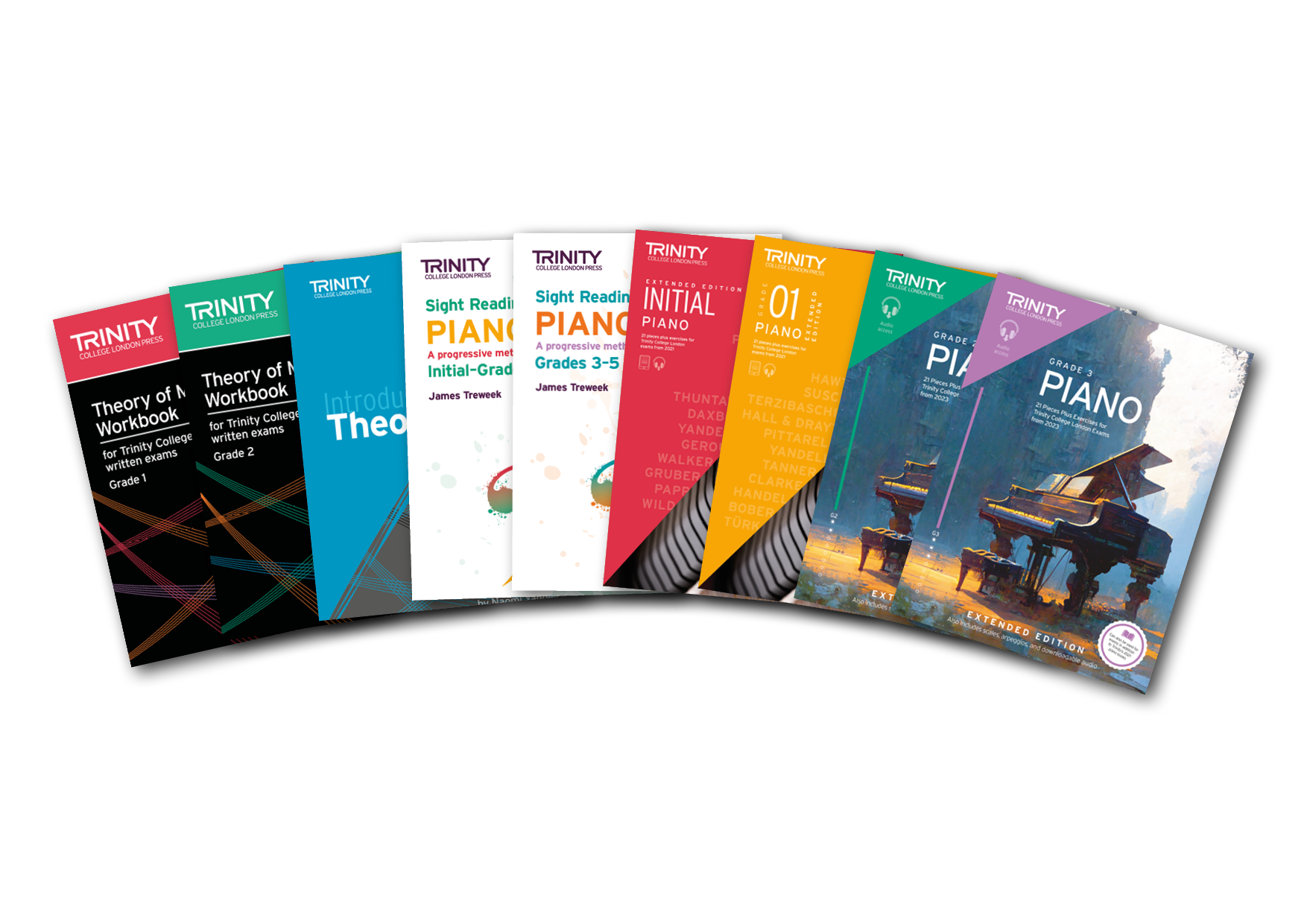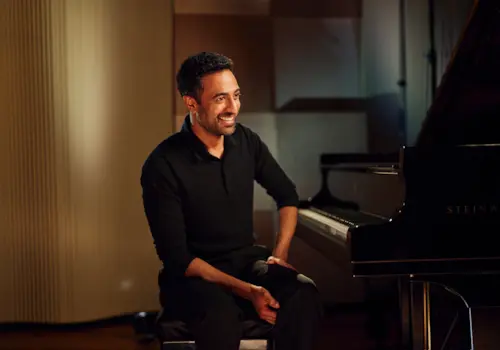27 July 2025
|
Trinity’s Piano Publications are there to guide you, from the first lesson at the piano all the way to Grade 8 and beyond.
Every musician starts ‘at the very beginning’, as famously sung in the hit musical The Sound of Music. Even those destined to become the greatest pianists begin by learning to find middle C. The experience of learning an instrument from the beginning and the pathways learners follow to reach their goals are therefore vital to their future success.
As both a music publisher and awarding body, Trinity College London takes seriously the responsibility of providing resources and qualification opportunities that support developing musicians right from the beginning of their journey and through every stage of their learning. Trinity’s publications and qualifications are designed with the understanding that each learner’s path is unique and valid.
Whether a student chooses to pursue recognition via exams or focus on personal musical growth, Trinity offers learners the freedom and flexibility to express themselves, perform to their strengths, and gain recognition for their skills by playing music they love - music that aligns with their interests and strengths - thereby fostering engagement and confidence.
REPERTOIRE FOR ALL TASTES
Trinity’s Piano publications support this ethos by offering a broad and diverse repertoire selection at all levels. In 2023, Trinity made a landmark decision to end the practice of rendering repertoire obsolete – a long-standing tradition in music assessment. This means learners are no longer restricted by fixed two- to three-year repertoire validity, after which they must purchase a new book to learn different pieces.
In the case of Piano, candidates can choose repertoire from a wide selection of Trinity books, available in both print and ebook formats, dating back to 2021. This gives them more than 42 pieces per grade to choose from and allows them to take as much time as they need to prepare, ensuring they take their exam when they feel most ready - reaching their full potential and performing to their unique strengths.
The available exam formats further support this flexible, inclusive ethos: in addition to the traditional face-to-face option, learners can take Digital Graded Exams and choose either a Technical work or a Repertoire-only pathway. This enables them to showcase their strengths at a time and in a setting where they can perform at their best.
Across the 2021 and 2023 Graded Piano Exam Pieces books, pianists at all stages can explore a selection like no other – with expertly arranged hit tunes, well-known Western Classical repertoire loved by learners and teachers alike, and original works by renowned international composers.
SHINING A SPOTLIGHT ON INITIAL TO GRADE 2
At every grade, learners select pieces from a variety of repertoire pathways, supporting the development of well-rounded technique and expressive performance across musical styes and genres. Popular highlights from Initial to Grade 2 include:
• Pieces by key Western Classical composers, such as Imitation and Inversion by Bartók (Initial), Passepied in C Major by Handel (Grade 1), and Hornpipe in E minor by Purcell (Grade 2).
• Specially commissioned pieces from an array of renowned international composers such as Autumn Waltz by Seána Davey (Initial), A Peculiar Party by Zhenyan Li (Grade 1), and Learning to Ride by Mark Choi (Grade 2).
• Popular favourites from around the world, expertly arranged at each level within the stage, screen, video games, classic and contemporary pop, jazz and Latin pathways, such as:
-The Pokémon Theme (Initial), 103 East 86th Street from She Stoops to Conquer (Grade 1), and Hedwig’s Theme from Harry Potter and the Philosopher’s Stone (Grade 2)
-Can’t Help Falling in Love (Elvis Presley, Initial), Titanium (David Guetta ft. Sia, Grade 1), and All of Me (John Legend, Grade 2)
-St Thomas (Sonny Rollins, Initial), Guajira Guantanamera (Diaz, Grade 1), and It Don’t Mean a Thing (If It Ain’t Got that Swing) (Duke Ellington, Grade 2)
A WAY TO LEARN THAT SUITS YOUR NEEDS
With the constantly evolving landscape of music education and technology, learning options for beginning musicians have expanded: alongside the traditional face-to-face or group lesson options, many piano lessons now take place online with a teacher, are guided by apps or videos, or learners teach themselves independently.
This shift creates new possibilities and greater accessibility in music education.
Trinity’s publications and qualifications provide a trusted resource that supports every kind of learner – with or without a teacher, preparing for exams or simply playing for personal development and enjoyment.
Key publications for beginner pianists include:
• Piano Exam Pieces Plus Exercises Initial-Grade 8 (2021 and 2023 series) -
Trinity’s graded Piano books include expert performance notes for every piece, offering essential insight to support both teacher-led and independent learning.
• Sight Reading Piano: A Progressive Method (Initial-Grade 2) -
Structured in 10 progressive lessons per level, with targeted exercises, carefully explained tips, and specimen tests, this series supports learners to practise independently from a teacher to become confident at sight-reading.
• Introducing Theory of Music –
A beginner’s guide to understanding, reading and writing music, leading directly into Trinity’s Theory of Music Workbook Grade 1. Clear explanations and practical tips make this the perfect resource for all types of learners.

EXPLORE TRINITY PIANO PUBLICATIONS HERE!
Whether sitting down at the piano for the first time or returning after a long break, starting lessons with a teacher or exploring self-paced independent learning, Trinity provides publications and resources to support every musical journey – all the way from first notes to Grade 8 level and beyond.
Exciting news for beginners!
Trinity will soon announce a brand-new publication for beginner pianists, designed to take learners from their first notes to Initial grade level. Written by James Treweek — experienced teacher, pianist, composer, and author of Trinity’s popular Piano Sight Reading: A Progressive Method series — this new book supports a strong foundation in technique and musicianship from the outset. Full of engaging pieces and lessons, beautifully illustrated, and accompanied by audio and video content, this publication aims to make starting the piano an enjoyable and enriching experience.
DOWNLOAD A FREE PREVIEW OF TRINITY’S PIANO FROM 2023 REPERTOIRE HERE!
SIGN UP FOR NEWS AND OFFERS TO BE THE FIRST TO HEAR ABOUT NEW RELEASES FROM TRINITY!







